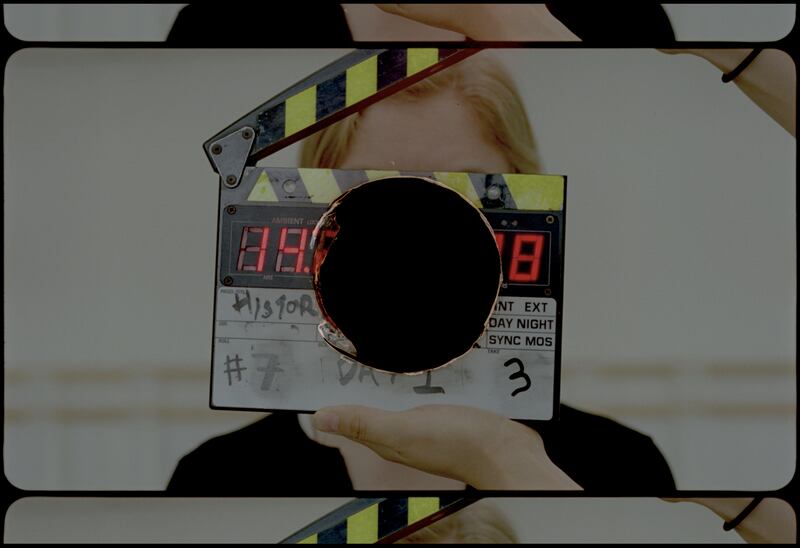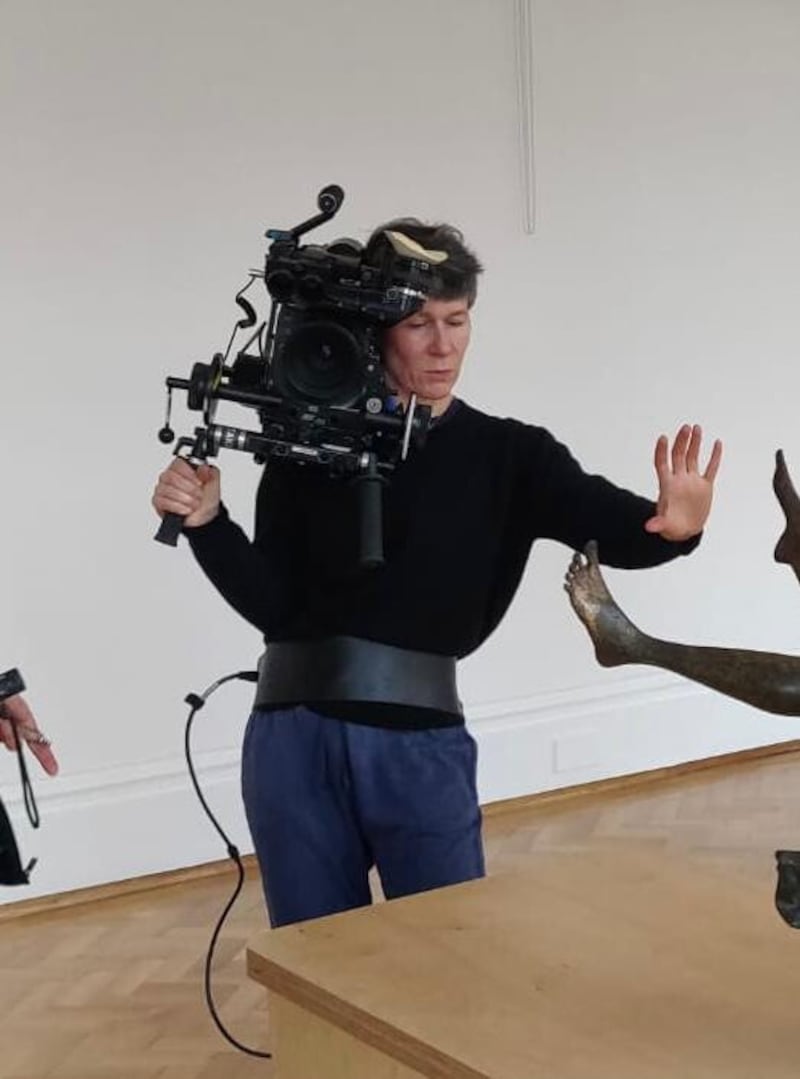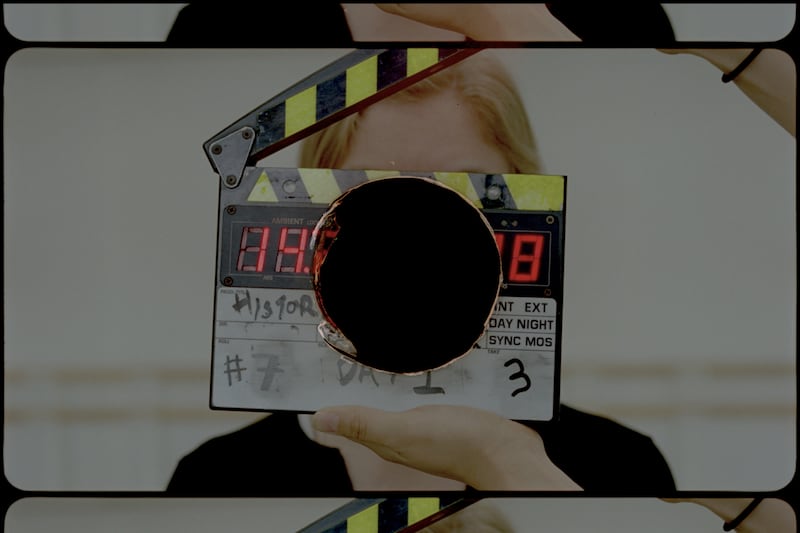History of the Present, a collaboration by writer Maria Fusco and American-British filmmaker Margaret Salmon, tells the story of ordinary lives, still dominated today by the looming presence of the Belfast peacelines.
This 45-minute ground-breaking film brings working-class women’s voices to the forefront, amplifying untold stories of marginalised communities and collective trauma.
Made on 35mm and SD video in the streets of Belfast, the Ulster Museum and the Royal Opera House, the work is set to be premiered at the QFT, Belfast on Wednesday, April 19 as part of a series of events organised by British Council Northern Ireland and the Belfast International Arts Festival to mark the 25th anniversary of the Good Friday Agreement.
Maria, what was your inspiration behind developing History of the Present?
I made a BBC Radio 4 documentary in 2019 about the peaceline I grew up beside in Ardoyne, North Belfast (Along the Peaceline) where I walked and talked the entire perimeter of the peaceline. It was the first time I had been to the other side, the Protestant side. I didn’t even know the name of the parallel street. After it broadcast, I was inundated with interest from folk who had never even heard about the peacelines. I knew then that the subject needed more attention, critical and creative attention.

Obviously, your own childhood in Ardoyne left a lasting impression upon you. Did you find the process of making History of the Present emotional?
Ardoyne was a very brutal place to grow up in during the Troubles. It feels like a friendlier, safer place now. I felt a responsibility to represent those hardships, that experience, to make a work which is open to interpretation, which is not beating a drum. In that way, it was a challenging work to push through. My own lived experience is essential in this work, I see my role as a ‘contemporary witness’ to our recent history in Northern Ireland.
Why did you choose the medium of experimental opera film?
I approached The Royal Opera House with the idea, insisting on the need to make a stronger commitment to working-class voices and to our small part of Ireland. I was fortunate they offered a Fellowship there, and began to develop the work.
A central question in the piece is ‘who has the right to speak?’ and crucially, ‘in what way’? This portrayal of marginalised voices, of women’s voices, is paramount. The operatic form can hold extremes of emotion, of experience; I wanted the dignity that opera can give to voice to shift its attention to ‘untraditional’ types of voices in the operatic scene.
I was delighted Margaret Salmon agreed to collaborate on the project. Her feminist image-making is intelligent and ethical: our project holds to these principals.
Did you do a lot of experimentation around getting the right soundscape? I believe the peace walls were even used as an instrument?
We decided not to include any visual archival materials in the work, but instead to use only sonic archival materials. To me, this was crucial as it is truer to the physical experience of being involved in violent events, such as riots. You are not necessarily standing at your front window staring out, you are much further back in the house and experience most of it through sound.
My own speaking voice is present, acting as an ‘aria’ situating some of the more socio-political questions that the work asked.
The opera singer, Heloise Werner, is improvising archival sounds, such as a helicopter and a Saracen; we invited her to use her voice in a challenging and unconventional way. It makes you really listen.
Composer Annea Lockwood’s work reveals something unique about the peaceline that is completely original. Her contact mic recordings let us hear the peaceline’s ‘voice’, letting it tell its own story. Annea is 83 now. She flew halfway across the world to come to Ardoyne to record it. You can’t help being humbled by her commitment to our project.
History of the Present was filmed on 35-mm film and SD. Did this present any challenges ?
Margaret shot all of the work, wrangling a giant 35mm camera around Belfast city centre on a Saturday evening, and up top of the Europa Hotel in gale-force winds; the camera assistants had to strap her to the safety rail. The fact that we were able to achieve the texture and intimacy that you can see in the film is solely down to Margaret’s skill.

What message would you like viewers to take away both locally and when it travels to London, Edinburgh and internationally?
The work is immersive, reparative and open-ended. We want it to communicate with an international audience, as well as the local one, speaking to economically challenged women, who have grown up in or still live in conflict zones. One of our creative partners is The Global Women’s Narrative Project, a NGO which collects women’s testimony from conflict and post-conflict countries across the world, I would hope that History of the Present contributes in some way to this idea.
What changes would you like to see happen to the area in which you grew up?
The peacelines are in 14 out of 20 of the most deprived wards in Belfast, Ardoyne is no exception to this: people need respect.
I believe you used archived material from your own family?
The archival voices you hear in the work are my family’s, recorded in the early 1970s and 1980s. I am the child you can hear crying and my Mammy is the adult woman’s voice. She died about 18 months ago, so it was difficult at times listening to her voice, it was a large part of her identity as a Belfast woman. I wanted to store authentic Belfast women’s voices in the work, I think they are beautiful and powerful.
Although a serious piece, you have weaved some Belfast humour in there - was that important to you?
Margaret and I had real laugh whilst we were editing the film together - possibly to counteract the seriousness of the subject matter. Humour is essential to the Belfast psyche, as a way of coping, of keeping going, you can’t make a work about Belfast without there being levity in it.
:: History of the Present, supported by the British Council, Creative Scotland and the Royal Opera House, is being premiered by the Belfast International Arts Festival at the QFT on Wednesday April 19 at 6pm, followed by a panel discussion. To buy tickets visit Belfastinternationalartsfestival.com.



